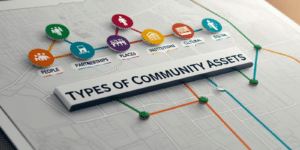Bringing an Equity Lens To Your Coalition or Network

During the Network Leadership Training Academy August Session, Abby Charles joined us to discuss how equity plays a role in coalitions and networks of partners. Whether you’re working to improve health outcomes, education opportunities, or protect the environment, bringing an equity lens to your coalition is important. Here are some of the key lessons, tools and takeaways that we learned about during this great session.
Start by Level-Setting.
It’s important to begin with everyone on the same page. Take time to train your team and partners on core concepts of equity. Here are a few foundational issues to cover:
- Why is equity an important issue for your network and partners to focus on?
- What are inequities? Differences which are unnecessary and avoidable but, in addition, are also considered unfair and unjust.
- Health Inequities specifically are systematic, socially produced, and unfair or unjust.
- Equity: “When all people have the opportunity to attain their full health potential – no one is disadvantaged from achieving this potential because of their social position or socially determined circumstance.” -The CDC
- Inclusion: “More than simply diversity & numerical representation, inclusion involves authentic and empowered participation and a true sense of belonging.
When we discuss inequity, we don’t just mean outcomes. We refer to processes, resource distribution, and systemic structures that help create support and sustain social justice. Equity isn’t something you do once -it’s a way of thinking constantly over time.
More Resources for Level-Setting:
- Robert Wood Johnson Foundation: Achieving Health Equity
- RWJF: What is Health Equity?
- Advancing Health Equity by Addressing the Social Determinants of Health in Family Medicine
- National Collaborative for Health Equity Resources
Conduct an Organizational Equity Assessment
With your partners on the same page, you should dig into your network practices and assess where you stand today when it comes to equity issues. Ensure your stakeholders are at the core of the process, no matter what specific tool you use. Here are three popular assessment tools:
- Annie E. Casey Race Matters Organizational Self-Assessment: A brief assessment of staff competencies and organizational processes.
- IHI Health Equity Self Assessment Tool: Created specifically for healthcare organizations and collaboratives.
- Local Health Department Organizational Self-Assessment for Addressing Health Inequities: An in-depth assessment for public health-related organizations.
Engage Affected Populations & Stakeholders
No matter which tool, assessment or analysis method you use, the key is to keep people at the center of the process. Continue asking yourself critical questions as you move through the process of analyzing and strategizing around equity. These questions include:
- Do we have the right people at the table? How can we broaden representation?
- Are we favoring members of included groups in our network processes?
- What role are power dynamics between partners playing? What would we change to improve equity in processes and outcomes?
- What is our mode of participation, ranging from co-opting to true collective action?
Use Disaggregated Data to Identify Inequities.
Evidence and data is an important tool for identifying inequitable outcomes, no matter the field you’re engaged in. The trick is to focus on disaggregating data to focus on disproportionate outcomes between racial, gender, age, education and income groups. You should also consider the historical context to begin thinking about the ways measurable outcomes today are affected by past practices and decisions. This brings us to the next step of identifying the root cause of inequity in our work.
Conduct a Root Cause Analysis
Expects currently estimate that around 60-70% of health outcomes are the result of our social, political and environmental context. Instead of dealing with surface-level individual factors, an equity lens demands that we try to identify the deeper, systemic causes of inequity. A Root-Cause Analysis (RCA) is a structured method for continually asking “why” to identify these root issues. Here are resources for conducting an RCA:
- Root Cause Analysis Tools & Resources (American Society for Quality)
- How to Perform a Root Cause Analysis (Masterclass)
Create Equitable Strategies to Target Root Causes
With your data identifying inequitable outcomes, and the results of your Root Cause Analysis, you can finally begin crafting strategies to target these root causes. However it’s important to continue to assess the way your tactics create unintended benefits or consequences. For example, a program to improve rental property inspections may intend to improve housing conditions. However it could unintentionally raise rental prices or expand the number underground, unregulated rental properties. Taking a systems-level perspective is critical to ensure you do no harm.
Budget & Provide Resources for Equity
A final reminder: Equity isn’t a one-time project. It’s a long-term process of continual adaption and improvement. With that in mind, it is important to budget for equity in your operations. Whether it’s staffing, funding, or other resources, ensure your network has what they need to continue assessing their equity work and adapting strategies accordingly. Without long-term support, equity efforts almost always languish and die. Commit with resources to emphasize that equity is a priority for your coalition or network.
Bringing An Equity Lens to Your Coalition or Network
We cannot solve all the issues of equity in the world tomorrow. However, with the right commitment, analysis and strategies, we’re bringing an equity lens to your coalition that truly create more effective, inclusive partnerships. Thank you to Abby Charles of the Institute for Public Health Innovation for these tools, frameworks and resources.

About the Author: Alex Derr, M.P.A.
Director of Marketing & Communications
Alex joined VNL in 2017, originally supporting our events. He now helps manages our communications and marketing strategy and content development work. Alex creates blogs, infographics, reports, and other content while managing our web and social media presence. He also runs our email marketing campaigns, tracks analytics, and conducts market research to drive our strategy. He supports our entire team with copywriting, graphic design and research, and helps with events, webinars, demos, and other online learning. When he isn’t at work Alex spends his time climbing 14ers (30 done, 28 to go!) and blogging on his own website, The Next Summit Blog.




